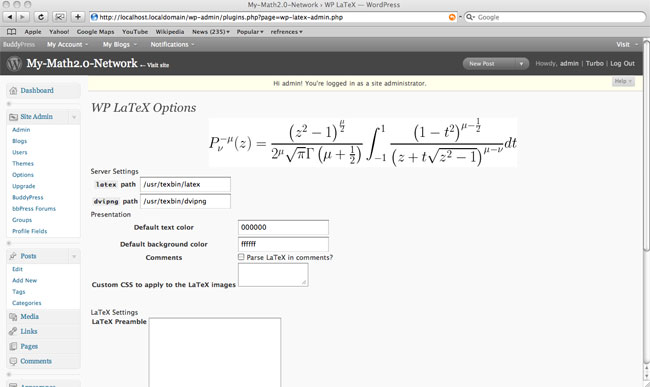Last time I promised to come back explaining how to set-up LaTeX-support, figuring I had to tell you about a few modifications I had to make in order to get Latexrender run on my mac…
A few google searches made it plain how out of touch I am on these matters (details below). But first, there was this comment to this series by Link Starbureiy :
“I took part in Gowers’ blog discussion. My input was to move things over to Google collaboration tools, like Google Knol, and perhaps Google Sites. However, those tools for large-scale collaboration may not be the best solution anymore. I like the NSN idea, but worry about it’s very long-term stability. Would you consider porting the project over to the Google App Engine so that it can be played with in the orkut sandbox (http://sandbox.orkut.com)?”
I thought I made it clear from the outset that I didn’t want to spend the rest of my life web-mastering a site such as NSN. All I wanted to show is that the technology is there free for the taking, and show that you do not have to be a wizard to get it running even on a mac…
I would really love it when some groups, or universities, on institutes, would set up something resembling this dedicated to a single arXiv-topic. Given our history, Antwerp University might be convinced to do this for math.RA but (a) I’m not going to maintain this on my own and (b) there may very well be a bandwidth problem if such a thing would become successful… (although, from past experiences and attempts I’ve made over the years, this is extremely unlikely for this target-group).
So please, if your group has some energy to spare, set-up your own math2.0-network, port it to Google Apps, Knol, Orkut or whatever, and I’d love to join and contribute to it.
As to LaTeX-support : this is trivial these days. First you need a working LaTeX-system on your virgin macbook. The best way is to download The MacTeX-2008 Distribution at work (it is a huge 1.19Gb download…). Next, install the fauxml-wordpress plugin (that is, download it to YourHome/Downloads and then drag the file faux-ml.php to the Library/WebServer/Documents/wp-content/plugins/ directory. Next, install likewise the WP-LateX plugin following the instructions, go to the configuring page and set the directory for latex and dvipng (if you follow my instructions they should be located at /usr/texbin/latex and /usr/texbin/dvipng), fill in the text color and background color you desire and clip your default latex-documentstyle/includepackages/newcommands section from your latest paper into the LaTeX Preamble window and believe me, you’re done!!!

